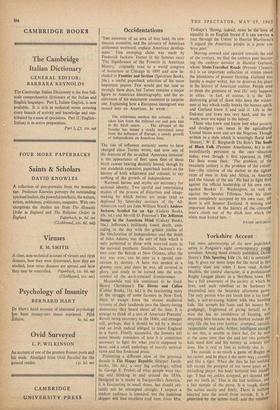Occidentations
THE existence of an area of free land, its con- tinuous recession, and the advance of American settlement westward, explain American develop- ment.' This sweeping claim was made by Frederick Jackson Turner in his famous essay 'The Significance of the Frontier in American History,' originally read to a world congress of historians at Chicago in 1893 and now in- cluded in Frontier and Section (Spectrum Books, 16s.), a useful paperback selection of his more important papers. Few would put the case so strongly these days, but Turner remains a major figure in American historiography, and the in- cisiveness of his statements continues to surprise one. Explaining how a European immigrant was turned into an American, he wrote :
The wilderness masters the colonist. . . . It takes him from the railroad car and puts him in the birch canoe. . . . The advance of the frontier has meant a steady movement away from the influence of Europe, a steady growth of independence on American lines.
The tide of influence certainly seems to have changed since Turner wrote, and now one of the features of the so-called 'American invasion' is the appearance of fleet upon fleet of those birch canoes bearing decently bound, though by our standards expensive, paperback books on the history of both wilderness and colonist, to say nothing of the growth of independence.
National heroes and myths are necessary for national identity. Two careful and entertaining studies of the process of distortion and image- making by which heroes are made (and so deplored by latter-day saviours of the All- American soul) are John William Ward's Andrew Jackson, Symbol for an Age (Galaxy Books, 10s. 6d.) and Merrill D. Peterson's The Jefferson Image in the American Mind (Galaxy Books, 16s.). Jefferson's brilliantly timed death, coin- ciding to the day with the golden jubilee of the Declaration of Independence and the death of John Adams, was the sort of luck which is only permitted to those with reserved seats in the national pantheon. Similarly, Jackson's vic- tory over the British at New Orleans, after the war was over, can be seen as a special con- cession by destiny. A hero was needed at a gloomy time, and there he was, all covered in glory, and ready to be turned into the arch- symbol of the do-it-yourself frontiersman.
Meanwhile real life continued to be lived. Henry Christman's Tin Horns and Calico (Collier Books, Ils. 6d.) is the fascinating story of the struggle of some farmers in New York State to escape from the almost mediaeval tyranny of their landlords into the liberty-loving democracy they heard about all the time. It is
strange to think of a sort of American Peasants' Revolt being necessary in the 1840s, and stranger still, perhaps, that it should be led by a doctor and an Irish radical obliged to leave England in a hurry. Finally successful, the farmers left some bloody reminders of how it is sometimes necessary to fight for what you're supposed to have, and a small anthology of heavily satirical verse and fine firebrand prose.
Presenting a different view of the previous decade is The Happy Republic (Harper Torch- books, 18s. 6d.), a very big anthology, edited by George E. Probst, of what people were say- ing and thinking in and around the 1830s.
Designed as 'a reader in Tocqueville's America,'
it is fascinating in small doses, but should cer- tainly not be attempted straight. I suspect a
student audience is intended, but the judicious skipper will find excellent stuff here, from Mrs.
Trollope's 'Strong, indeeil, must be the love of equality in an English breast if it can survive a tour through the Union' to Harriet Martineau's 'I regard the American people as a great em- bryo poet.'
Moving onward and upward towards the end of the century, we find the embryo poet becom- ing the embryo novelist in Hamlin Garland, whose Main-Travelled Roads (Premier Classics, 4s.) is an important collection of stories about the bloodiness of pioneer farming. Garland was hardly a major writer, but he deserves his place in the history of American realism. People tend to think the grimness of 'real life' only happens in cities: in fact, of course, it is the life- destroying grind of those who keep the wilder- ness at bay which really breaks the human spirit, and Garland knew it and said it. Life in the Dakotas and Iowa was very hard, and the re- wards were not equal to the labour.
Those who knew and know best what poverty and drudgery can mean in the agricultural United States were and are the Negroes. Though written in a style which is wincingly florid and 'literary,' W. E. Burghardt Du Bois's The Souls of Black Folk (Premier Americana, 4s.) is ex- traordinarily pertinent to the race situation today, even though it first appeared in 1903.
Du Bois wrote then: 'The problem of the twentieth century is the problem of the colour- line—the relation of the darker to the lighter races of men in Asia and Africa, in America and the islands of the sea.' He had to fight then against the official leadership of his own race, against Booker T. Washington, as well as against the Senator Tillmans. Now his ideas seem completely accepted by his own race, yet there is still Senator Eastland. A moving and important book in the history of the coloured man's climb out of the ditch into which the white man kicked him.
JULIAN MITCHELL






































 Previous page
Previous page